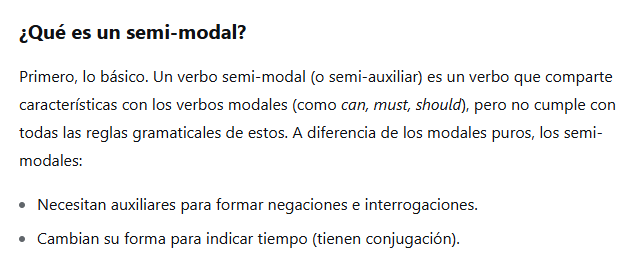Set up Ruby
- Sep 2025
-
blog.rubygems.org blog.rubygems.org
-
-
-
 * to be able to
* quit whining = deja de cajarte.
* to be able to
* quit whining = deja de cajarte.
-
-
chat.deepseek.com chat.deepseek.comDeepSeek1
- May 2025
-
ipfs.indy0.net ipfs.indy0.net
-
A living systems] approach requires that the person applying this way ofthinking see what they are working on as a system of energies or life processes,rather than as things
for - noun vs verb
-
- Apr 2025
-
ipfs.indy0.net ipfs.indy0.net
-
First Nationspeople56 some of whose native languages were verb based and expressed processbetter than the noun-heavy English language. Such verb-based languages were
for - language - verb-based - Navajo
-
-
ux.stackexchange.com ux.stackexchange.com
-
"Log in" is a valid verb where "Login" is a valid noun. "Signin", however, isn't a valid noun. On the other hand, "Signup" and "Sign up" have the same relationship, and if you use "Log in", you'll probably use "Register" as opposed to "Sign up". Then there's also "Log on" and "Logon", and of course "Log off" or "Log out".
-
-
www.youtube.com www.youtube.com
-
it is an activity so futuring makes the future into a verb so the what we study is how you future how you are actively working on on Futures
for - futuring - a verb - actively working towards a specific future
-
- Nov 2024
-
www.myenglishpages.com www.myenglishpages.com
Tags
Annotators
URL
-
-
justpublishingadvice.com justpublishingadvice.com
Tags
Annotators
URL
-
-
-
-
english.stackexchange.com english.stackexchange.com
-
www.oxfordlearnersdictionaries.com www.oxfordlearnersdictionaries.com
-
I logged in to my social media accounts.
Good example showing it's "in to" and not "into".
See https://english.stackexchange.com/questions/5302/log-in-to-or-log-into-or-login-to
-
- Oct 2024
-
Local file Local file
-
Fleeting notes
I've never like the phrase fleeting notes, though it does serve a purpose. It's really a conflation (or portmanteau) of two separate ideas: fleeting ideas and writing them down/capturing them quickly so that they're no longer fleeting. Sort of a noun/verb in form.
-
- Jan 2024
-
grammarlyonline.com grammarlyonline.com
-
grammarist.com grammarist.com
-
-
- Nov 2023
-
developers.google.com developers.google.com
-
"Sign up with Google"
-
-
docs.cypress.io docs.cypress.io
-
logIntoMicrosoft
I think
logInToMicrosoftwould be slightly better, but this is surely much better than the completely incorrectloginToMicrosoft -
loginTo
Incorrect. Should be
logInToorlogInto, same as it is in the other functions,logIntoMicrosoft, ...
-
-
www.grammarly.com www.grammarly.com
-
set [x] up
-
- Oct 2023
-
docs.google.com docs.google.com
- Mar 2023
-
dictionary.cambridge.org dictionary.cambridge.org
-
build something in/into something phrasal verb with build verb
-
-
www.reddit.com www.reddit.com
-
You can also find the combination verb+in+to, but in that case you're usually dealing with a phrasal verb consisting of a verb and the particle "in", which happens to be followed by the preposition "to".They wouldn't give in to our demands.
-
"Built in to" appears when you use the phrasal verb "build in" followed by an infinitive, but that is not what you are trying to do in your sentence.There's an electronic switch built in to stop all data transfers.
-
- Apr 2022
-
www.duolingo.com www.duolingo.comDuolingo1
-
(Note that although 'n/yn here is not actually translated into English, it does act as a marker showing that the action is 'in progress', unfinished.
"yn" (or it's contraction "'n") is a marker in Welsh to indicate that the action of a verb is in progress or unfinished.
Example: Dw i'n hoffi coffi.
-
- Jan 2022
-
Local file Local file
-
“ demonstrate” is a stronger reporting verb
-
- Sep 2021
-
Local file Local file
-
I will detail expressions of emotional labour by my par-ticipants –in the form of pro-social motivations, entrepreneurial risk,financial precarity and the navigation of ethical complexities, includinggender, race and class dynamics –before turning to the implicationsof this labour on changing fashion practises.
Here is an example of when the author uses present tense before switching back to past tense
-
Social entrepreneurs are also considered to face increased businessrisk compared to traditional entrepreneurs;
The verb tense has changed back to the past tense. Sometimes the author interjects to describe her own feelings in the present tense as well.
-
SF entrepreneurs like Greenpants play a crucial role in the“unmaking of unsustainability”6 of fashion, yet they face a range ofchallenges in this quest
Goes from past to present tense in the same section.
-
-
www.grimmstories.com www.grimmstories.com
-
gefressen
to have eaten
Tags
Annotators
URL
-
- Mar 2021
-
en.wikipedia.org en.wikipedia.org
-
a stative verb is one that describes a state of being, in contrast to a dynamic verb, which describes an action
-
-
jangawolof.org jangawolof.orgPhrases1
-
VERB CONJUGATION
Indicative / Present
damay dem (I go)
dangay dem (you go) singular
dafay dem (he/she goes)
dañuy dem (we go)
dangeen dem (you go) plural
deñuy dem (they go)
Indicative / Imperfect
dama doon dem (I went)
danga doon dem (you went) singular
dafa doon dem (he/she went)
dañu doon dem (we went)
dangeen doon dem (you went) plural
deñu doon dem (they went)
Indicative / Pluperfect
demoon naa (I had gone)
demoon nga (you had gone) singular
demoon na (he/she had gone)
demoon nañu (we had gone)
demoon ngeen (you had gone) plural
demoon nañu (they had gone)
Indicative / Future
dinaa dem (I will go)
dinga dem (you will go) singular
dina dem (he/she will go)
dinañu dem (we will go)
dingeen dem (you will go) plural
dinañu dem (they will go)
Imperative / Active
demal (go!) singular
demleen (go!) plural
Negations
demumaa (I didn’t go)
demul (he/she didn’t go)
demunu (we didn’t go)
demuleen (you didn’t go)
demuñu (they didn’t go)
-
- Sep 2019
-
hypothes.is hypothes.is
-
annotating
-
running
verb
-
- Mar 2019
-
www.fresnostate.edu www.fresnostate.edu
-
This is one of many pages that lists verbs at various levels of Bloom's old taxonomy (verb lists for the new version are easy to find as well). This one has green bars across the page so may not be best for those who are trying to preserve ink though it is easy and attractive to use if referring to it on the screen. Rating 4/5
-
- Aug 2018
-
wendynorris.com wendynorris.com
-
Among the reasons this may be so is that the simple future tense is more open-ended than the future perfect tense, the latter seeming to convey a sense of closure and a focus on specific events, which is unlike the simple future tense in which anything is possible (Weick 1979, pp. 198-99). It is well to note that although Weick did not explicitly frame his argument in terms of metaphor, it is really another example of the past-as-metaphor-for- the-future idea developed in this chapter, albeit a more precise manifestation of it. The precision comes in Weick’s conclusion that some futures are more like the past, are more similar to it than others. In his argument, the future described in future perfect terms is more similar to the past than the future described in simple future terms.
future perfect tense appears to generate a sense of focus and closure while simple future tense is more open-ended.
Weick theorizes that future perfect tense casts the description of a future event in more detail.
-
To consider the future, it may help to treat it like the past, that is, as ifit had already happened. This is the premise Weick proposed in his discussion of future perfect thinking (1979, pp. 195-200). Future perfect thinking is a grammatical prescription instructing managers and planners and all who consider the future to do so in the future perfect tense. Thus rather than the simple future tense as used in a statement like “We shall overcome,” the future perfect128Eternal Horizonstense would have us say, “We shall have overcome.” Alfred Schutz believed that the “planned act bears the temporal character of pastness' (Schutzs emphasis), because the actor projects the act as completed and in the past, a paradox that places the act in both the past and the future at the same time, something the future perfect tense makes possible (1967, p. 61). These were insights that Weick both noted (1979, p. 198) and built upon to explain why future perfect thinking may make it easier to envision possible futures.
Interesting proposal to use future perfect tense to envision the future.
is that happening to an extent with the multiple uses/tenses of "update" in the SBTF transcripts?
-
- Apr 2018
-
newclasses.nyu.edu newclasses.nyu.edu
-
synge
This would have been pronounced "sin-gay", as it was divided into two syllables instead of one.
-
- Mar 2018
-
-
Becauseでしょう indicates guess, it can be used for current events and past events that we are not certain.
This is like the subjunctive in English and Spanish, but instead uses a form or the copula, です, instead of conjugating the verb into another form.
-
- Jan 2018
-
hunabku.pbworks.com hunabku.pbworks.com
-
is
You are talking about the future, so the verb must be in future form
-
can not
cannot DO
-
because we exhaust
-
´s
things is plural
-
- Jan 2017
-
engl4030-5030.tumblr.com engl4030-5030.tumblr.com
-
question
Might we say questioning to maintain the verbiness of rhetoric?
Tags
Annotators
URL
-
- Oct 2015
-
www.nationalreview.com www.nationalreview.com
-
will do
-
haven’t noticed
-
are
-
is
-
have
-
owns
-
s
-
are
-
were
-
could stop
-
’re
-
post
-
can
-
doesn’t happen
-
believes
-
are
-
oppose
-
can stop
-
tire
-
was
-
obtained
-
would be
-
might
-
can bemoan
-
can talk
-
is
-
tell
-
makes
-
look
-
should be
-
think
-
is
-
accept
-
can be
-
understand
-
let’s
-
lose
-
are
-
need
-
ask
-
does
-
will claim
-
takes
-
is
-
is
-
are
-
is
-
is
-
will hold
-
occurred
Tags
- imperative verb
- verb in the apodosis of a conditional sentence
- verb in the protasis of a condition sentence
- verb in the protasis of a conditional sentence
- verb in direct discourse
- verb in a relative clause
- verb in the apodosis of a condition sentence
- verb in indirect discourse
- verb in an indirect question
- impersonal verb
- verb
Annotators
URL
-
- Mar 2015
-
Local file Local file
-
b a r k i n g
This is describing the action.
-
